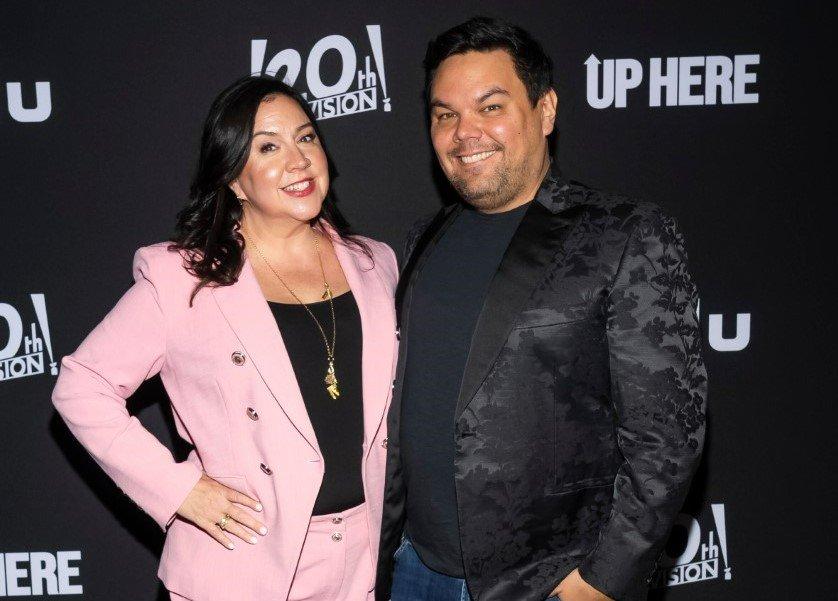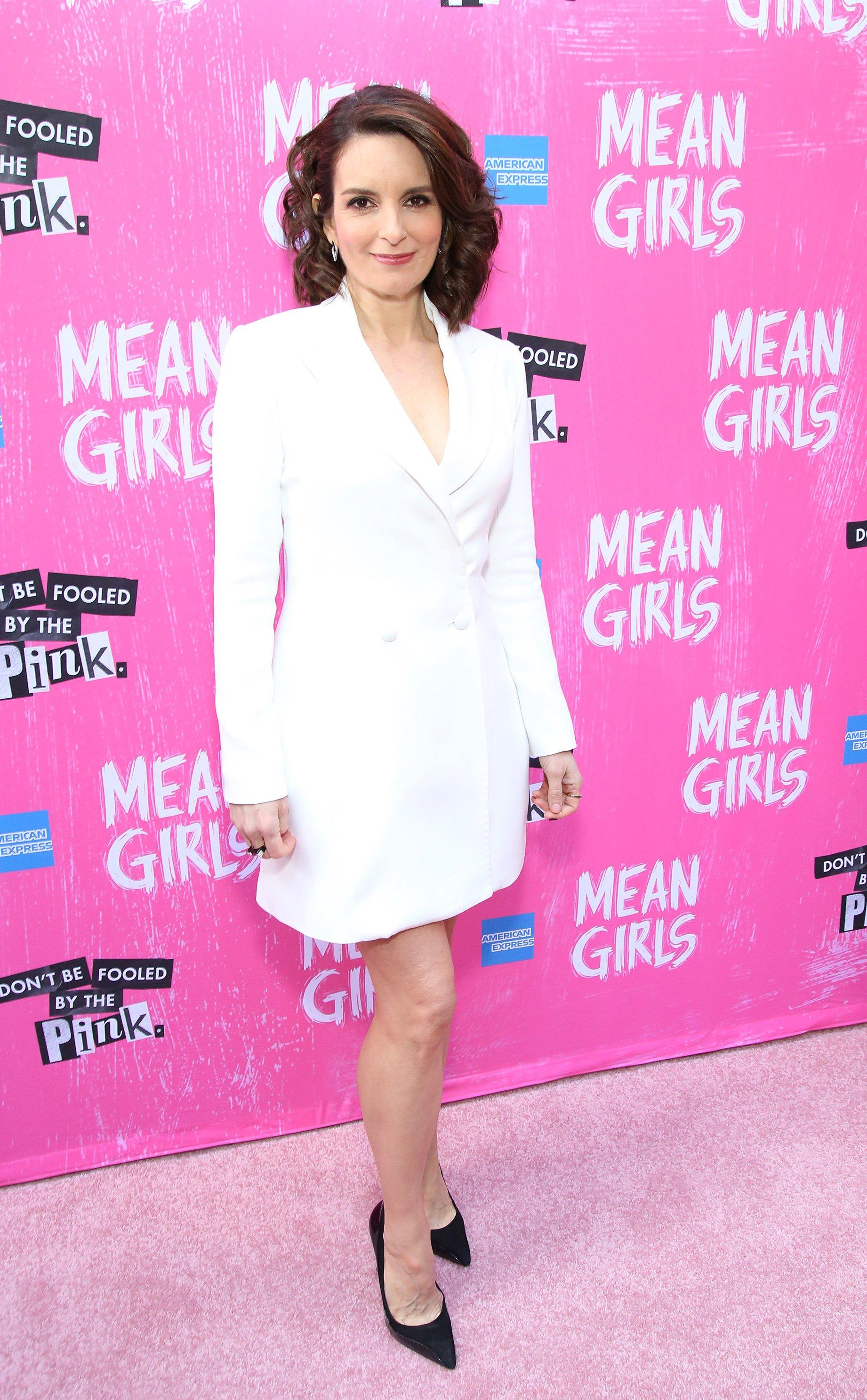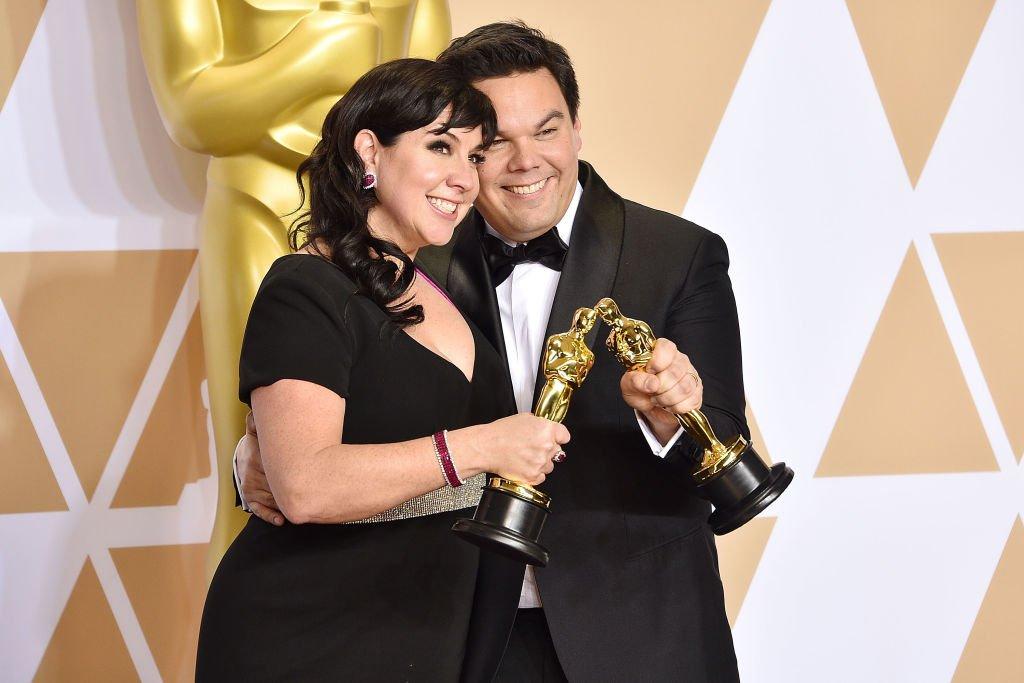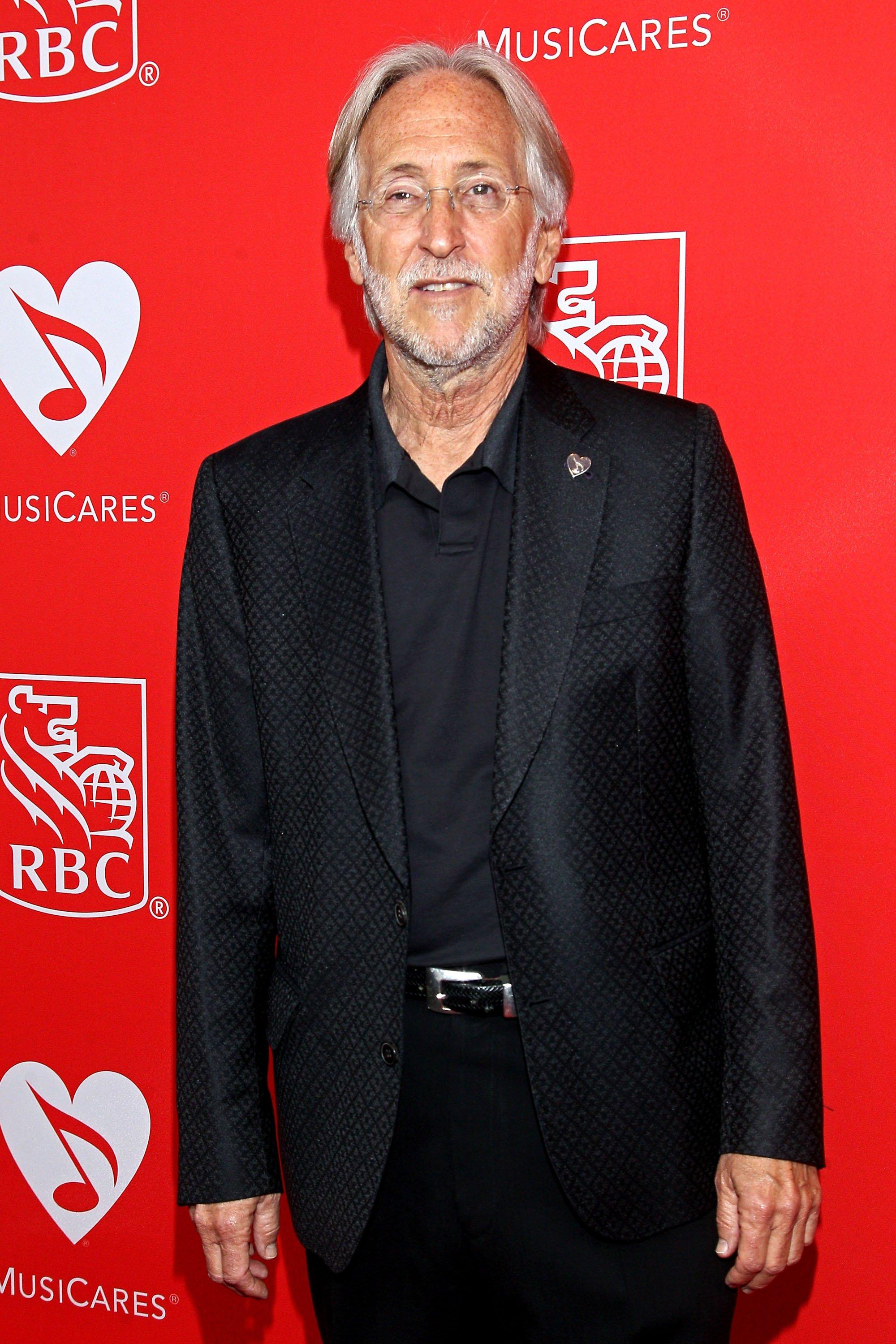Photo: Ben Hide/Picture Group for Hulu

interview
From "Let It Go" To "Remember Me": Songwriters Bobby Lopez & Kristen Anderson-Lopez Share Stories Behind Their Most Popular Songs
GRAMMY-winning songwriters Bobby Lopez and Kristen Anderson-Lopez have penned wildly popular songs for the screen. The writers behind hits from 'Coco,' 'Frozen,' "WandaVision" and Hulu's "Up Here" detail how these songs took form.
At the premiere of the Hulu musical comedy TV series, "Up Here," two-time EGOT winner Robert "Bobby" Lopez and his wife, Kristen Anderson-Lopez, said they saw their love reflected on screen. While the new series isn't based on the song writers’ real-life courtship, "these characters have a lot of us in them," explained Bobby.
Set in 1999, the eight episode series follows Lindsay (Mae Whitman) and Miguel (Carlos Valdes) as they fall in love while navigating old memories, fears and fantasies in their heads. It’s based on a musical the Lopezs premiered in San Diego in 2015.
"We put so much of our love for each other into this show," Kristen told GRAMMY.com over Zoom. Adds Bobby, "She was kind of on the rebound. And I was just grateful to be able to date anyone because I was living with my parents at the time. We didn't know it was fate at first, but it became clearer and clearer."
In the years since, the couple have earned a slew of awards for their combined efforts: Two Oscars (Frozen’s "Let it Go" and "Remember Me" from Coco); an Emmy for "Wandavision’s" "Agatha All Along; and GRAMMY Awards for Best Song Written For Visual Media and Best Compilation Soundtrack For Visual Media. Bobby Lopez picked up an additional golden gramophone for Best Musical Theater Album at the 54th GRAMMYs for his work on The Book Of Mormon.
In honor of the new series — for which the Lopezes wrote 21 original songs — GRAMMY.com spoke with the couple about the stories behind five of their greatest hits.
"To be clear about it, we're not trying to make hits," Bobby said firmly. "We’re not Max Martin. We don't write pop songs. We're telling a story. If we're lucky enough to have a hit, which is a rarity in this day and age in terms of musical theater, it's because the audience reacts. it's always due, in part, to the story."
"Who Am I and Who Are You?" ("Up Here")
Bobby: We spent a good year working on the story, the characters and the concept of the show. It was around March 2021 when we wrote the songs for the first two episodes. The rest of the songs we had to cram into about four months.
Kristen: It's a song that's about being right at the beginning of a relationship, when there's somebody very exciting. With each step forward, you're creating a trajectory that could either end in a 20 year marriage or end [right there] with a random guy.
[Director] Tommy [Kail] had this brilliant idea of building the sets next to each other, even though [the characters are] in completely separate places. For this one moment, while they're singing in harmony with each other, they're right next to each other. They are only separated by the divide of the scrim.
"Let It Go" (Frozen)
Bobby: It's so long ago that we wrote it that it's almost like we didn't write it. At this point, I'm just sort of a fan of it.
Kristen: It belongs to everybody now.
Bobby: The entire story was different when we first came on. Elsa was the villain like in the classic Disney story. She had blue skin and blue hair. The younger sister was the prim and proper one — the perfect princess a little bit obsessed with the details of planning her wedding to Hans. They were sort of unlikable. Elsa was very vindictive.
Kristen: It was a great live action, but there wasn't the joy and the strong feelings that you'd want to hear songs about. So, we completely revamped the characters. The second child gets to be more of a wild kid. It's the first child who gets the pressure. We created an outline from there.
There was this moment we called "Elsa’s badass song" where we knew she was going to transform from her perfectionism into the Snow Queen. We started talking about what were moments like that in our own lives where we had so much pressure that the idea of actually the whole thing falling apart would have been a relief.
Bobby: I imagined if I messed up on the SATs and didn’t get into Yale and my whole life was over. That’s how I related to her. You'd feel devastated. You'd feel destroyed but there might be a little spark of relief that the weight of the world is off your shoulder.
Kristen: That really resonated with me because I was raising two small children and feeling so much pressure from every walk of life: Being the perfect mom, being the perfect wife, having a cool house and the right clothes and being the right weight and having a great career.
I imagined if that fell apart and I got to hang out in my yoga pants and drink chardonnay for a day. We were walking in Prospect Park and I jumped on a picnic table and tried to imagine what that would feel like. We wrote the rest of the song that afternoon.
Bobby: [The lyric "let it go"] was Kristen’s pitch. Kristen said she wanted to pitch the song title "Let It Go." I said, "Yeah, I get it. I think it’s a little on the nose but why don’t we wait." Kristen wisely ignored me and everyone was like ‘yeah!’"
Kristen: There are very few moments in life where I will go against something we agree on in a public meeting. But in this one case, it was just right. I'm glad I did.
"Into the Unknown" (Frozen II)
Kristen: Bobby thinks really hard about what is the role of the music going to be in every project. In "Avenue Q," it's about lessons. In "Frozen," every song is about love. And in Frozen II, every song is about growth.
Bobby: There's no such thing as "Let It Go" part II. You can’t write a sequel to a song. It doesn’t work. In Frozen, Ana is the protagonist…in "Frozen II", it's Elsa’s story. "Into The Unknown" is Elsa's "want" song. We wanted to make it a duet but we didn't have a character for her to sing it with. So we invented this voice that was haunting her and calling her away. It became a mystery of who the voice is.
No one said ["make another hit"] to us and we wanted to create a successful story. We were just told to do it the same way we did the first one: let's make a great story with these two of these characters that we love.
"Remember Me" (Coco)
Kristen: "Remember Me," had to be both a lullaby and also a tour-de-force signature song for a bombastic, narcissistic performer.
Bobby: We listened to every single hit song that had ever come out of Mexico, and really did our research about the different styles of Mexican music. We're not Mexican. I'm Filipino, and Kristen is Swedish and Irish. It was a process of downloading everything there was to learn. Then we tried to forget about it and write the song we needed to write.
There was a puzzle-nature to it, because the lyrics had to mean two things and the music had to work in two ways. It had to be an uptempo, slightly smarmy, flashy, signature closing song. At the same time — when you slowed it down, simplified the arrangement with keeping every note of the tune the same and keeping every chord of the progression the same — it needed to transform into something far more sweet, intimate and from the heart. That was the trick of it.
I like to wait, before I write anything, before I play anything, before I feel like this could be it. We had waited and waited and waited. It was really time to write it. When I sat down to the piano after we got the kids out to school, I was still not dressed.
Kristen: He was in his boxers.
I just wrote the lyrics on the F train. But I think an important piece of this is that we're songwriters who had to leave our children at home in New York and go to Burbank to work on Frozen and Coco. We were actually writing little original lullabies for our own girls that they could sing with their babysitter. So it was very close to my heart. It was this idea of leaving a song that's like a bedtime hug for your child. So it really flowed from there.
Bobby: Something that people might not know or understand is that the timeline of when we wrote that song was very close to when we wrote, "Let It Go." We were working on both movies at once. It was just a great moment in our lives. I guess we were really feeling very inspired having young kids. It will do that to you when you're writing for Disney.
"Agatha All Along" ("WandaVision")
Kristen: "Agatha All Along'' surprised us and came out of nowhere. It was something about the pandemic and this moment in January 2021. We were completely isolated after so many months. We, as a country, were watching this show about a woman who was also isolated.
Bobby: She’s literally living in a bubble.
Kristen: That's one of the reasons that "Wandavision" hit in such a big way. "Wandavision" was the most fun job ever. We, as Gen Xers, grew up watching these TV shows. If you were sick, you started with "I Love Lucy" in the morning and by eight o'clock you were watching "Family Ties." So it was in our DNA.
Bobby: It was a treat to finally have a break from writing musical theater numbers where you have to be so involved with the creation of the story. With this, it's just music playing in the background. We had so much freedom to just execute.
Kristen: It was called "That’s So Agatha" in the script. It was supposed to be a "That’s So Raven" idea. We were in college when "That’s So Raven" happened so we didn't have that in our musical DNA so much. What we did have in our musical DNA was "The Addams Family" and "The Munsters" — all of these themes that were kind of Goth, camp and jazz inspired. That's how we found "Agatha All Along." And the most important thing was also matching Katherine Hahn’s energy.
Bobby: The funny thing was, when we read all the scripts at the beginning of the process, we were bowled over by it. But we kind of forgot a lot of the details. We knew that Agatha was the villain but we didn't know exactly why. We forgot what it was that she was doing all along.
We asked Marvel before we started writing it, "What did Agatha do again?" They explained it to us and we said we were not going to put any of that in. We don’t understand that. We are just going to write that she did it all along. It was her.

Tina Fey
Photo: Walter McBride/Getty Images
news
"Mean Girls," "SpongeBob SquarePants" Lead 2018 Tony Award Nominees
Blockbuster musicals lead the pack of nominations; Bruce Springsteen to receive special recognition for his one-man show
Nominations for the 72nd Annual Tony Awards were announced on May 1, with a trio of wildly popular musicals leading the way. The Tina Fey-penned "Mean Girls" musical and "SpongeBob SquarePants: The Broadway Musical" each earned a whopping 12 nominations. Following close behind, "The Band's Visit" earned 11 nominations. All three of the top nominated shows are up for Best Musical along with "Frozen," which earned three nominations.
<iframe width="620" height="349" src="https://www.youtube.com/embed/x1l-HRvwnB4" frameborder="0" allow="autoplay; encrypted-media" allowfullscreen></iframe>
The "SpongeBob SquarePants: The Broadway Musical" nomination for Best Original Score (Music and/or Lyrics) Written For The Theatre includes a host of GRAMMY-winning artists, such as Steven Tyler and Joe Perry of Aerosmith, John Legend, T.I., Cyndi Lauper, and Lady Antebellum.
<iframe width="620" height="349" src="https://www.youtube.com/embed/axNSAyvTBwc" frameborder="0" allow="autoplay; encrypted-media" allowfullscreen></iframe>
The Tony Awards also announced their recipients of honors in non-competitive categories, including a Special Tony Award that will be bestowed to Bruce Springsteen for his one-man show "Springsteen On Broadway." A full list of the nominees and recipients can be found on Playbill.
This year's Tony Awards will be hosted by GRAMMY nominees Sara Bareilles and Josh Groban. Bareilles was nominated for the GRAMMY for Best Musical Theater Album at the 59th GRAMMY Awards for Waitress. The show will air live on Sunday, June 10 from Radio City Music Hall in New York City on CBS at 8 p.m. ET.
Pit Players: Meet The Musicians Behind Broadway's Biggest Shows

Kristen Anderson-Lopez and Robert Lopez
Photo: David Crotty/Patrick McMullan/Getty Images
news
'Coco': "Remember Me" Wins Oscar For Best Original Song
Previous winners for 'Frozen''s "Let It Go," songwriters Kristen Anderson-Lopez and Robert Lopez win again, making him the only double-EGOT
In a repeat from the Oscar success of Frozen four years ago, the movie Coco won on March 4 for Best Animated Feature as well as for Best Original Song. The previous winning song was titled "Let It Go" and encouraged self-expression. This year's "Remember Me" is an instruction that will be obeyed, as songwriting couple Kristen Anderson-Lopez and Robert Lopez must now consider whether there is room for their second Oscar on their awards shelves.
<iframe width="620" height="349" src="https://www.youtube.com/embed/3iDxU9eNQ_0" frameborder="0" allow="autoplay; encrypted-media" allowfullscreen></iframe>
At the 57th GRAMMY Awards, the Frozen composers won for Best Compilation Soundtrack For Visual Media and for "Let It Go," which won Best Song Written For Visual Media. Robert Lopez previously had won Best Musical Theater Album at the 54th GRAMMY Awards for composing The Book Of Mormon together with "South Park" creators Trey Parker and Matt Stone.
The acronym EGOT stands for Emmy, GRAMMY, Oscar, and Tony, the four major entertainment industry awards voted on by peer professionals. Thanks to his track record of Broadway and television success, this second Oscar win puts Robert Lopez over the top to become the first person ever to win two of each award.
<iframe src="https://tools.applemusic.com/embed/v1/song/728904000?country=us" height="110px" width="100%" frameborder="0"></iframe>
Robert Lopez has won three Tony Awards for his stage work, Best Book Of A Musical and Best Original Score for The Book of Mormon and a previous Best Original Score for the imaginative Avenue Q, which combined human actors with puppets. He twice won the Daytime Emmy Award in Outstanding Music Direction and Composition for "The Wonder Pets," which ran for four seasons.

Recording Academy President/CEO Neil Portnow
Photo: Steve Mack/FilmMagic
news
GRAMMY Music Education Coalition Brings Music To Public Schools
The special initiative works to deliver music resources to students in underserved communities nationwide
The GRAMMY Music Education Coalition has officially launched, and it will work to bring musical opportunities to students nationwide, especially in underserved communities, starting with Nashville, Tenn., Philadelphia and New York City.
<iframe width="620" height="349" src="https://www.youtube.com/embed/bvomHFZO0mk" frameborder="0" allowfullscreen></iframe>
A group of more than 30 organizations, including National Association for Music Education, the NAMM Foundation, VH1 Save the Music Foundation, and Lang Lang International Music Foundation, the Coalition will provide strategic funding and services to its targeted school populations.
"The big dream was what if every young person had the opportunity to be involved with music through the public school system," Recording Academy President/CEO Neil Portnow told Billboard. "What if we were able to pool our energy, efforts and resources with others in the music industry who are also doing fine work in music education to attack this big dream? The partnerships we are creating with school districts, teachers, parents, and youth are designed to drive systemic change across geographies and communities nationwide."
One of the organization's first initiatives is a partnership with Disney*Pixar's new film, Coco, which sees a 12-year-old guitarist chase his dreams of being a great musician. Walt Disney Studios, GMEC and Berklee College of Music's Berklee Pulse will collaborate to provide educational materials. In addition, Disney*Pixar will donate 300 Cordoba guitars with Guitar Center providing an additional 300 guitars to be delivered to partner schools before the end of the year.
This first initiative is just the beginning of what the GMEC hopes is a long-term effort to bring the far-reaching benefits of having a music education to students nationwide.
"The benefits of music education extend far beyond the classroom," says GMEC Executive Director Dr. Lee Whitmore. "By increasing the number of students actively making music, we're fostering the development of essential cognitive and social skills that better prepare them for success as well as beginning a lifelong appreciation of music."
Berklee Online Adds Master's Programs For Music Production, Business

Photo: Kevin C. Cox/Getty Images
news
2024 Paris Olympics Opening Ceremony: Watch Celine Dion, Lady Gaga, Gojira & More Perform
The Olympic Games have long featured iconic musical performances – and this year is no different. Check out the performers who took the stage in the City of Light during the 2024 Olympics Opening Ceremony in Paris.
The 2024 Paris Olympics came to life today as the Parade of Nations glided along the Seine River for the opening ceremony. The opening spectacular featured musical performances from Lady Gaga, Celine Dion, and more. Earlier in the week, some of music’s biggest names were also spotted in the city for the Olympics, including Olympics special correspondent Snoop Dogg, BTS' Jin, Pharrell Williams, Tyla, Rosalía, and Ariana Grande.
Read More: When The GRAMMYs & Olympics Align: 7 Times Music's Biggest Night Met Global Sports Glory
Below, see a full breakdown of some of the special musical moments from the 2024 Paris Olympics opening ceremony.
Lady Gaga
In a grand entrance, Lady Gaga emerged behind a heart-shaped plume of feathers on the golden steps of Square Barye, captivating the audience with her cover of the French classic "Mon truc en plumes." Accompanied by cabaret-style background dancers, she flawlessly belted out the song, executed impressive choreography, and even played the piano.
Lady Gaga’s connection to the song is notable, as Zizi Jeanmarie, the original artist, starred in Cole Porter’s musical "Anything Goes," which was Lady Gaga’s debut jazz release.
"Although I am not a French artist, I have always felt a very special connection with French people and singing French music — I wanted nothing more than to create a performance that would warm the heart of France, celebrate French art and music, and on such a momentous occasion remind everyone of one of the most magical cities on earth — Paris," Lady Gaga shared on Instagram.
Celine Dion
Closing out the ceremony with her first performance in four years since being diagnosed with stiff-person syndrome, Celine Dion delivered a stunning rendition of Edith Piaf’s everlasting classic, "L’Hymne à l’amour" from the Eiffel Tower. Her impressive vocals made it seem as though she had never left.
This performance marked Dion’s return to the Olympic stage; she previously performed "The Power of the Dream" with the Atlanta Symphony Orchestra and composer David Foster for the 1996 Olympics.
Axelle Saint-Cirel
Performing the National Anthem is no small feat, yet French mezzo-soprano Axelle Saint-Cirel knocked it out of the park.
Dressed in a French-flag-inspired Dior gown, she delivered a stunning rendition of "La Marseillaise" from the roof of the Grand Palais, infusing the patriotic anthem with her own contemporary twist.
With the stirring lyrics, "To arms, citizens! Form your battalions. Let’s march, let’s march," Saint-Cirel brought the spirit of patriotism resonated powerfully throughout the city.
Gojira
Making history as the first metal band to perform at the Olympics Opening Ceremony is just one way Gojira made their mark at the event.
The French band took the stage at the Conciergerie, a historic site that once housed French kings during medieval times and later became a prison during the French Revolution, famously detaining Marie Antoinette – Creating a monumental moment as the first metal band to perform at the ceremony, but also stirring the pot as they used the chance to nod toward politics.
Performing a revamped version of "Ah! Ça Ira," an anthem that grew popular during the French Revolution, the artists aren’t new to using their songs as a vehicle for political messages. The GRAMMY-nominated group are outspoken about issues concerning the environment, particularly with their song, "Amazonia," which called out the climate crisis in the Amazon Rainforest. Using music to spread awareness about political issues is about as metal as it gets.
Aya Nakamura
Currently France’s most-streamed musician, Aya Nakamura went for gold in a striking metallic outfit as she took the stage alongside members of the French Republican Guard. As there were showstopping, blazing fireworks going off behind her, she performed two of her own hit songs, "Pookie" and "Djadja," then followed with renditions of Charles Aznavour’s "For Me Formidable" and "La Bohème."
Although there was backlash regarding Nakamura’s suitability for performing at the ceremony, French President Emmanuel Macron dismissed the criticism. "She speaks to a good number of our fellow citizens and I think she is absolutely in her rightful place in an opening or closing ceremony," Macron told the Guardian.
Latest News & Exclusive Videos

2024 Paris Olympics Opening Ceremony: Watch Celine Dion, Lady Gaga, Gojira & More Perform

Ice Spice Is The Drill Queen On 'Y2K!': 5 Takeaways From Her Debut Album

New Music Friday: Listen To New Songs From Halsey, MGK And Jelly Roll, XG & More

Watch Young MC Win Best Rap Performance In 1990

The Red Clay Strays Offer A New Kind Of Religion With 'Made By These Moments'
